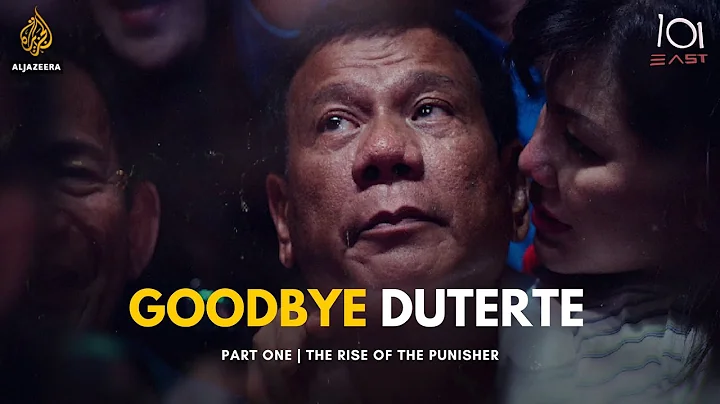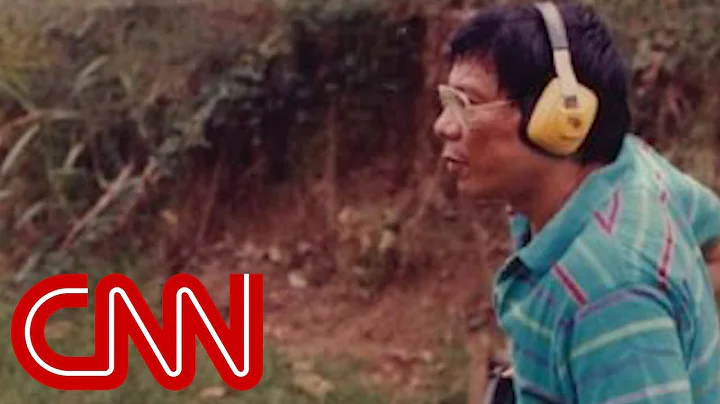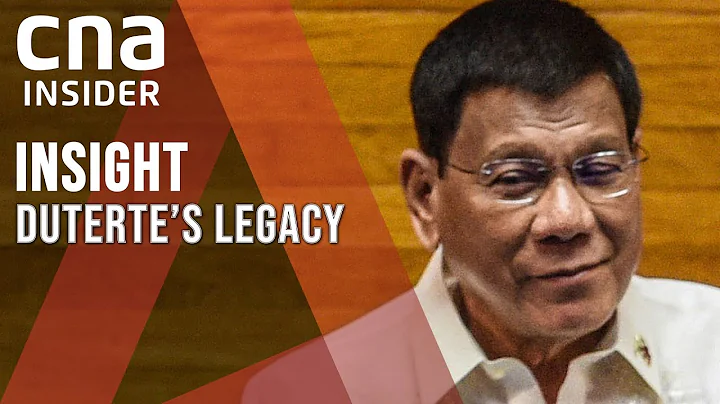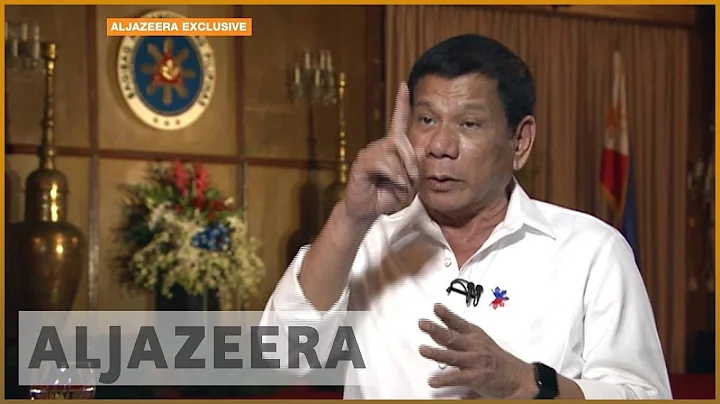Lai Yiyu
Six years ago, Duterte (Rodrigo Duterte), who had a distinct strongman character, became the president of the Philippines amidst an uproar. Many people worried that his anti-drug war, extrajudicial killings and other policies would lead to Philippine society has brought scars that are difficult to heal. However, Duterte used the Philippines' mid-term elections after three years in power to prove with astonishing results that voters actually approve of his iron-fisted methods. The COVID-19 epidemic he encountered in the latter stages of his administration did not defeat him, because even though Philippine society was indeed severely affected, his public support remained high.

On May 9, 2022 local time, the current President of the Philippines Duterte voted in the election in his hometown of Davao City.
Under the influence of rain and dew, his daughter Sara Duterte (Sara Duterte Carpio) became a popular candidate to run for president last year. After partnering with Ferdinand "Bongbong" Marcos, Jr. and participating in the vice-presidential race, Sarah even received more votes than Marcos, Jr., who ran for president. It was obvious that she took advantage of her father's support. The political dividends gained by reputation cannot be underestimated.
From this point of view, the reason why Marcos was elected president was that in addition to his administrative and legislative qualifications and his family's political strength in the Philippines, his political alliance with the Duterte family cannot be ignored. In particular, Marcos lost the last election to the current Vice President Leni Robredo by a very small number of votes. His alliance strategy this time can be said to be quite effective. In addition to his overwhelming victory in his own electoral districts in the northern island of Luzon, Marcos also succeeded in overturning most of the southern regions of Mindanao, where most of the votes in the last general election were based on Leni. Leni ultimately had to stick to her original ticket base in Central Visayas.
The result of this Philippine election is actually not just the impact of the alliance between political families. In recent years, there has been an argument that has repeatedly appeared in Philippine society, claiming that most people no longer trust liberal politicians. This argument shows that the liberal camp took political and economic power after the "People Power" revolution in 1986. They criticized the dictatorship of Ferdinand Marcos Sr. from 1965 to 1986 and used this to emphasize their freedom. , How important is democracy and progressive ideas. However, many Filipinos believe that most of these politicians come from powerful political families, and some families have already had political power as early as the colonial period. It is for this reason that their political line has become increasingly unpopular after they failed to effectively reform Philippine society over the past decades in power. Even though Leni is not like a candidate from a typical political family, since most of her staff and connections are from the liberal camp, some people cannot trust Leni to lead the Philippines on a new path.

On May 10, 2022 local time, in Manila, the capital of the Philippines, Ferdinand Romualdez Marcos, the presidential candidate of the Philippine Federal Party, celebrated his victory.
In view of this, some people will think that the dissatisfaction of Philippine voters with the political elite during the two general elections is the similarity between Duterte and Marcos Jr.'s victory. Of course, the question of who the political elite is is actually quite vague and leaves room for debate. For example, in 2016, Duterte, who repeatedly emphasized that he represented the voice of the grassroots, was criticized for being a second-generation politician. Faced with such doubts, he himself insisted that he was not as ungrounded as the traditional political elite in Manila. In the end, he was indeed considered to be able to make some innovations in the political arena, and became the first Mindanao-born politician in the history of the Philippines. president.
However, the Marcos family has controlled Malacañang Palace, the highest palace of Philippine politics, for 20 years, including 9 years of martial law. Although their family was forced into exile after the "People Power" revolution, they did not lose power in the political arena. On the contrary, after returning to the Philippines, family members continued to occupy a place in both the local and central government.In this way, can we say that the victory of Marcos and Sara is similar to the rise of Duterte? How should we understand the choices made by the Filipino people from Duterte to Marcos Jr.? And what are the similarities and differences between Marcos Jr.’s election as president and that of Duterte back then?
The narrative of the confrontation between elites and the masses
In March 1971, an article titled "A Decent Gentleman's Agreement?" "The article was published in The Philippines Free Press. The article used a list of illegal oligarchic politicians announced by then-President Marcos Sr. as an introduction, criticizing that the executive and legislative branches monopolized by political families would only be able to protect each other's vested interests and would not be able to make decisions on shortcomings. substantial reform. Although the article did not directly indicate whether Marcos Sr. would succumb to these unspoken rules, it also questioned the effect of the list it published: In addition to portraying Marcos Sr. as a leader of the masses and revolting against the rich, the list also has other What kind of functionality?

On April 11, 1969, Philippines, President Ferdinand Marcos delivered a speech at the inauguration ceremony of the 92-meter-high concrete cross of the war memorial on the top of the mountain. The collapse of the monument was a death knell for the Japanese invaders. On the same day, President Marcos held a flag-raising ceremony after the review ceremony.
Looking at the political development of the Philippines, the antagonistic narrative between the elite and the masses has always been an important source of power driving people's discourse and actions. Leftist protesters often use the late Spanish colonial resistance as an example, emphasizing that the revolution at that time failed because the main leaders organized the people with bourgeois liberal ideas, and finally compromised and accepted the takeover by the United States. The latter used colonial rule to guide the gradual implementation of "democracy" in the Philippines. It is also because of this that they do not believe in the independent Philippine government after the war. They believe that the rulers are basically the ruling class cultivated by the American colonial regime and cannot truly get along with the people of the Philippines.
In addition to the narratives of the protesters, the Philippine elections within the system are also no stranger to such narratives. The seventh president Ramón Magsaysay’s campaign song “Magsaysay Mambo” (1953), which was sung in the streets, is a classic example. The lyrics first criticized the chaotic order of the Philippines after independence, and then hinted at how corrupt his rival Elpidio Quirino was during his tenure as president, thereby setting off his image of being from a lower class and honest and caring for the people. This campaign song was first launched by a presidential candidate in the history of the Philippines. It not only achieved unprecedented success for Magsaysay, but also became popular again more than thirty years later through the broadcast of underground radio stations on the eve of the "People Power" revolution. The fire became one of the important symbols that encouraged people to take to the streets to overthrow the old Marcos regime.
Ironically, when Marcos Sr., who was later equated with corruption, was sent to Malacañang in the 1960s, he was also called a "son of the masses" by people who expected reforms in the Philippines. . Although his father served as a representative of Ilocos Norte during the American colonial period, their political family, which originated from the agricultural region of northern Luzon, was still considered to be related to the political elite that ruled in Manila. different. Even though the elder Marcos later married Imelda Romualdez Marcos and formed an alliance with his wife's powerful Royaldes family, many people still believe that he will be able to lead the Philippines to challenge the majority. Resource political families and the landowning class.
How did Marcos Sr. outline his vision to everyone at that time?
We can see from some of the works published by Marcos Sr. during his tenure as president that in order to legitimize his governance methods, he constantly emphasized the use of "democratic revolution" as a method to correct Philippine political culture.Among them, he mentioned in his book "The Democratic Revolution in the Philippines" (The Democratic Revolution in the Philippines) published in 1974: Due to the influence of colonial rule in the Philippines, the class and unequal relationship between landlords and the masses has basically been finalized. Even during the war, The various "social justice" and "land reform" programs promoted by successive governments have been unable to shake this structural dilemma. Therefore, without allowing the social order to collapse, Marcos Sr. advocated that his authoritarian rule be legally authorized through the Constitution so that he could initiate reforms within the system.
Before Marcos Sr. implemented martial law in 1972, Philippine society was facing multiple economic and political crises. These crises formed important conditions for him to later declare martial law. At that time, many people took to the streets to protest, including the increasingly serious domestic inflation problem, opposition to the government sending troops to assist the US military in the war in Vietnam, and some people because of the "Jabidah Massacre" of government troops in 1968. Massacre killing Muslim soldiers. Because of this, in addition to several Muslim separatist organizations from Mindanao beginning to demand independence through armed actions, some leftist protesters were dissatisfied with the weak performance of the original Communist Party (Partido Komunista ng Pilipinas) and decided to establish a new Communist Party (Partido Komunista ng Pilipinas) in 1968. Communist Party of the Philippines), reviving the armed revolutionary line that had been almost abandoned by the former. Even though Marcos Sr. may have had many reasons for imposing martial law, such as suppressing opposition, preventing the rise of communist armed forces, and realizing his governing ambitions, the narrative of opposition between elites and the masses also served as an excuse to shape and legitimate his methods. one that cannot be ignored. The list of illegal oligarchs mentioned above is probably one of these methods.
Looking at this historical context, it may not be difficult to understand why Marcos Jr. constantly wants to refute the past history of martial law and even try to revise the current mainstream historical views. His camp tried to use this to tell the Filipino people that the more those liberal politicians criticized martial law, the more they revealed their own vested interests and intricate family political networks that they wanted to conceal. When the anti-Marcos camp believed that the key to the problem was the lack of adequate and appropriate historical education among Filipinos, many people criticized this as simply intellectual arrogance, and some pointed out that the supporters of the liberal camp were the real ones. The brainwashed party.
The root causes of violence that underpin the functioning of democracy in the Philippines
In 2009, former President Corazon Aquino (commonly known as Mrs. Aquino, Corazon "Cory" Aquino) passed away, leaving her son Aquino III (Benigno "Noynoy" Aquino III was elected president the following year with extremely high approval ratings. The reason why this matter deserves to be mentioned again at this time is that the mother and son are important symbols of democratization in the Philippines after the "People Power" revolution in 1986. The reason why Corazon was elected as president by the anti-dictatorship camp was because her husband, Benigno "Ninoy" Aquino Jr., was the most prestigious person in the Philippines during the martial law period. The leader of the opposition party was shot and killed by an unknown person in 1983, which aroused indignation among opposition forces at home and abroad, and thus contributed to people's unity in revolutionary action.

On July 18, 2014, local time, in Manila, Philippines, the Chief of General Staff of the Armed Forces of the Philippines changed his name. Philippine President Aquino III attended the ceremony.
Although Aquino III once again took up the baton from his mother by recalling the history of more than 20 years ago, this also made the Filipino people realize that the slogans such as freedom and democracy emphasized by the "people power" revolution may have some significance. To a certain extent, it is just a slogan. In particular, the military operation code-named "Oplan Bayanihan" (Oplan Bayanihan) promulgated by Aquino III after taking office was in the name of promoting peace and development plans by the security department, but in fact it was used behind the scenes to attack dissidents with armed forces. Many people feel that the government and the many political elites and families behind it are only using these means to protect their own political and economic interests.
What is not to mention is that before Aquino III came to power, presidents from the liberal camp often used military means to stabilize the internal order of society. On the one hand, the root of this problem comes from the fact that after the "People Power" revolution, Mrs. Aquino failed to effectively deal with the military, so dissidents continued to be intimidated, imprisoned, and even threatened with their lives; on the other hand, local Political families continue to consolidate their political power with armed forces such as the military and police or outsourced militia. In addition, domestic armed rebel forces such as the Communist Party and Muslim radical organizations continue to occupy each side. These have been the problems of the Filipino people in the past few decades. the political realities faced.
Perhaps at the very beginning, Duterte’s rise was simply the result of Philippine voters’ distrust of the liberal camp; however, Duterte used his past experience in governing Davao City in the south to City)’s more than 20 years of experience have been brought to the level of national governance, and finally the political violence used by Philippine politicians behind the scenes has been openly exposed in the sun. The difference is that Duterte boldly pointed out that these violence are measures for the welfare of the people. Although the anti-drug war is being waged in the form of horrific extrajudicial killings, the people feel relatively comfortable with killings in the name of national security.
The most direct feedback from the people is reflected in electoral politics: Ronald dela Rosa, who was elected to the Senate with the highest number of votes in 2019, and Padilla, who also came first in the Senate race this year (Robin Padilla), both of whom strongly support Duterte's anti-drug war and extrajudicial killings. The former was even the police chief who directly implemented the anti-drug war before becoming a senator.
What is interesting is that the reason why Duterte began to join politics was actually related to the "people power" revolution that year. During the martial law period, Duterte's mother, Soledad Duterte, was an important figure in leading the "Yellow Friday Movement" in Mindanao to protest against the old Marcos regime. This background led Mrs. Aquino to ask Sulida if she was willing to serve as mayor of Davao City after taking power. Duterte, on the other hand, began his more than 20-year ruling career in Davao City on the recommendation of his mother.
Before Duterte took over, Davao City was an important laboratory for the Communist Party to develop its urban guerrillas in the 1980s. To this end, the government used infiltration of organizations to provoke and divide internal members through psychological warfare, causing internal chaos within the Communist Party. Seriously clean the guts. After that, some people ran away and became members of anti-communist volunteer vigilante groups and militia groups. These people became Duterte's key players in dealing with many reactionary forces in Davao City, which once made Davao City the most secure place in the Philippines. One of the good cities.
Duterte’s previous experience in power and his presidential term revealed that the Philippines’ democracy after the “people power” revolution actually relied on the support of political violence to operate. This does not mean that the people Duterte killed deserved their death, but this experience has become the reason for many people to defend the persecution of human rights caused by martial law in the Philippines. It is also an important reason for Marcos and his family to defend themselves in this election. One of the conditions.
directly blaming the problem on fake news or the lack of adequate historical education among today's young students may not be enough to paint a complete picture of the matter. Especially when the combination of Marcos and Sarah has extremely high support rates among almost all age groups, it is not very responsible to put all the responsibility on young people. Faced with such a tense situation, it is certainly important to understand the operation of knowledge production, information circulation channels and social media, but what we should be more aware of is the narrative of opposition between elites and the masses that is deeply embedded in Philippine society, as well as the fundamentals of Philippine democracy. the source of violence behind it. How did these aspects continue from the colonial period to today and become the way to influence the way people think about political action in the Philippines? This will not only help us analyze what happened in the current presidential election in the Philippines, but also point out the angle from which we can observe Philippine society in the future.
Editor in charge: Wu Qin
Proofreader: Shi Jun





















